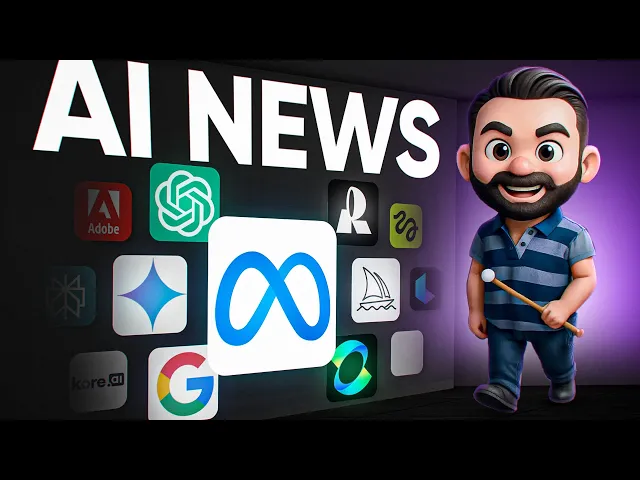AI News: 22 Advancements That Happened This Week!

Meta AI app launches as digital assistants go social
The revamped Meta AI app signals a strategic shift in how tech companies are positioning artificial intelligence in our daily lives—beyond utility and into social connection.
Meta's transformation of their Ray-Ban "View" app into "Meta AI" creates a standalone chat platform running on Llama 4, with capabilities spanning text conversations, image generation, and crucially, social sharing. Meanwhile, Google and OpenAI continue refining their offerings with search integrations and personality tweaks that reveal how these companies are racing to make AI both more useful and more personable.
Key Points
- Meta's new AI app transforms conversations into shareable social content, allowing users to post AI interactions to a feed where others can like and comment—effectively socializing the AI experience
- Privacy policy changes for Meta's Ray-Ban glasses reveal the company will store voice recordings for up to a year for AI training while promising not to use photos/videos
- Google's new AI mode in search is rolling out to US labs users, positioning it as a direct competitor to Perplexity and ChatGPT's search features
- OpenAI rolled back recent GPT-4o personality updates after Sam Altman criticized the model for becoming "sycophantic" and overly flattering
The Social AI Revolution
The most fascinating development in this week's AI news isn't about technical capabilities but about integration strategies. Meta's approach to AI stands apart from competitors by embedding social mechanics directly into their AI interface.
What makes this particularly significant is how it fundamentally changes the AI interaction model. Where most AI assistants remain private tools for productivity or information retrieval, Meta is positioning AI conversations as shareable content worthy of likes and comments. This transforms AI from a utility into a social experience—a quintessentially Meta approach that leverages their core competency in social networking.
This signals a potential future where AI-generated content becomes part of our social identity. Just as we currently share photos, thoughts and articles, we might soon routinely share our AI conversations and creations. The competitive landscape is shifting from who has the most capable AI to who can most successfully integrate AI into existing social behaviors.
Business Models Behind AI Assistants
The revelation that Meta plans to eventually incorporate ads into their AI app highlights the emerging business models for consumer AI. While most companies have
Recent Videos
How To Earn MONEY With Images (No Bullsh*t)
Smart earnings from your image collection In today's digital economy, passive income streams have become increasingly accessible to creators with various skill sets. A recent YouTube video cuts through the hype to explore legitimate ways photographers, designers, and even casual smartphone users can monetize their image collections. The strategies outlined don't rely on unrealistic promises or complicated schemes—instead, they focus on established marketplaces with proven revenue potential for image creators. Key Points Stock photography platforms like Shutterstock, Adobe Stock, and Getty Images remain viable income sources when you understand their specific requirements and optimize your submissions accordingly. Specialized marketplaces focusing...
Oct 3, 2025New SHAPE SHIFTING AI Robot Is Freaking People Out
Liquid robots will change everything In the quiet labs of Carnegie Mellon University, scientists have created something that feels plucked from science fiction—a magnetic slime robot that can transform between liquid and solid states, slipping through tight spaces before reassembling on the other side. This technology, showcased in a recent YouTube video, represents a significant leap beyond traditional robotics into a realm where machines mimic not just animal movements, but their fundamental physical properties. While the internet might be buzzing with dystopian concerns about "shape-shifting terminators," the reality offers far more promising applications that could revolutionize medicine, rescue operations, and...
Oct 3, 2025How To Do Homeless AI Tiktok Trend (Tiktok Homeless AI Tutorial)
AI homeless trend raises ethical concerns In an era where social media trends evolve faster than we can comprehend them, TikTok's "homeless AI" trend has sparked both creative engagement and serious ethical questions. The trend, which involves using AI to transform ordinary photos into images depicting homelessness, has rapidly gained traction across the platform, with creators eagerly jumping on board to showcase their digital transformations. While the technical process is relatively straightforward, the implications of digitally "becoming homeless" for entertainment deserve careful consideration. The video tutorial provides a step-by-step guide on creating these AI-generated images, explaining how users can transform...
